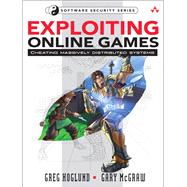
Note: Supplemental materials are not guaranteed with Rental or Used book purchases.
Purchase Benefits
What is included with this book?
Greg Hoglund has been involved with software security for many years, specializing in Windows rootkits and vulnerability exploitation. He founded the website www.rootkit.com, and has coauthored several books on software security (Exploiting Software: How to Break Code and Rootkits: Subverting the Windows Kernel, both from Addison-Wesley). Greg is a long-time game hacker and spends much of his free time reverse engineering and tooling exploits for new games. Professionally, Greg offers in-depth training on rootkit development and software exploits. He is currently CEO of HBGary, Inc. (www.hbgary.com), building a world-class product for software reverse engineering and digital forensics.
Gary McGraw is the CTO of Cigital, Inc., a software security and quality consulting firm with headquarters in the Washington, D.C., area. He is a globally recognized authority on software security and the author of six best-selling books on this topic. The latest, Software Security: Building Security In, was released in 2006. His other titles include Java Security (Wiley), Building Secure Software (Addison-Wesley), and Exploiting Software (Addison-Wesley). He is the editor of the Addison-Wesley Software Security Series. Dr. McGraw has also written more than 90 peer-reviewed scientific publications, writes a monthly security column for darkreading.com, and is frequently quoted in the press. Besides serving as a strategic counselor for top business and IT executives, Gary is on the advisory boards of Fortify Software and Raven White. His dual Ph.D. is in cognitive science and computer science from Indiana University where he serves on the Dean's Advisory Council for the School of Informatics. Gary is an IEEE Computer Society Board of Governors member and produces the monthly Silver Bullet Security Podcast for IEEE Security & Privacy magazine.
| Foreword | |
| Preface | |
| Why Games | |
| Game Hacking 101 | |
| Money | |
| Enter the Lawyers | |
| Infested with Bugs | |
| Hacking Game Clients | |
| Building a Bots | |
| Reversing | |
| Advanced Game Hacking Fu | |
| Software Security Uber Alles | |
| Index | |
| Table of Contents provided by Publisher. All Rights Reserved. |
The New copy of this book will include any supplemental materials advertised. Please check the title of the book to determine if it should include any access cards, study guides, lab manuals, CDs, etc.
The Used, Rental and eBook copies of this book are not guaranteed to include any supplemental materials. Typically, only the book itself is included. This is true even if the title states it includes any access cards, study guides, lab manuals, CDs, etc.